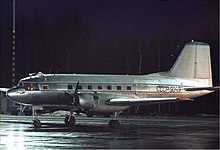This article relies largely or entirely on a single source. (December 2024) |
Aeroflot Flight 2723 was a Soviet domestic passenger flight from Bina International Airport to Makhachkala Airport. On 23 April 1966 the Ilyushin Il-14 operating the route ditched in the Caspian Sea following engine problems.
 An Ilyushin Il-14 similar to the one involved in the crash | |
| Accident | |
|---|---|
| Date | 23 April 1966 |
| Summary | Double engine failure for reasons unknown, ditching at sea |
| Site | Caspian Sea, south of the Absheron Peninsula |
| Aircraft | |
| Aircraft type | Ilyushin Il-14P |
| Operator | Aeroflot |
| Registration | CCCP-61772 |
| Flight origin | Bina International Airport |
| Stopover | Makhachkala Airport |
| Destination | Saratov Airport |
| Passengers | 28 |
| Crew | 5 |
| Fatalities | 33 |
| Survivors | 0 |
Aircraft
editThe Ilyushin Il-14P involved was built in 1956 and flew until 1959 registered as CCCP-Л1772 for Aeroflot, before the registration was changed to СССР-61772. By the time of the accident, the aircraft had completed 16,257 flying hours.[1]
Accident
editThe Il-14P departed at 07:42 local time from Baku for Saratov with a stopover in Makhachkala. The weather at the time of departure was heavy rain and thick clouds with a ceiling of 140–200 m (460–660 ft). About 12 minutes after takeoff, at an altitude of 1,500 m (4,900 ft), the pilots reported engine problems and assumed that the cause was wet spark plugs. The flight turned around to return to Baku, but during the approach the left engine began vibrating and lost power.
At 07:59, the crew reported that the temperature had dropped sharply in both engines. The crew descended to 200 m (660 ft) over sea, but due to the poor visibility the crew could not locate the airport and flew back out over the Caspian Sea. The pilot then sent an SOS and radioed that he had to ditch the aircraft in the sea. That was the last radio contact with Flight 2723.
Investigation
editNo trace of the aircraft was found until 13 May 1966 when the wreckage was found by accident on the seabed in 23 m (75 ft) of water some 18–20 km (11–12 mi) south of Nargin Island by Navy divers searching for another sunken object. The aircraft and most of the bodies of those on board were removed from the water by a floating crane. The fuselage had little significant damage, indicating that the aircraft hit the water at a shallow angle and remained relatively intact. The investigation was unable to find the cause of the engine failures.
See also
editReferences
edit- ^ "Il-14 c/n 146000310". Scramble Soviet Transport Database.